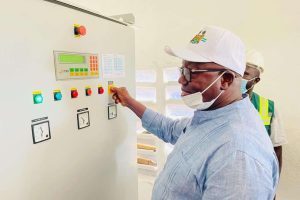
Sierra Leone’s minister of energy, Alhadji Kanja Sesay, has tendered his resignation.
Naija News understands that Sesay’s resignation comes amidst recent disruptions in the country’s electricity supply.
According to a statement from the president’s office on Friday, the specific reasons for Sesay’s resignation were not officially disclosed, and the energy ministry did not provide any comment in response to AFP’s request.
As per a press release from the presidency, the ministry will now be directly overseen by President Julius Maada Bio, with the assistance of two other officials.
Sesay’s resignation coincided with the government’s payment of $18.5 million to Turkish Karpowership and Transco-CLSG group, two power providers to whom Sierra Leone owed a total of $40 million.
It remains unclear whether Sesay’s resignation is directly linked to these payments. Following the announcement of the payments, power was restored in Freetown after a two-month period of outages, as reported in the media.
Karpowership, which has been supplying electricity to Sierra Leone since 2018 through a floating offshore unit, had recently reduced its capacity from 65 megawatts to just five due to payment issues.
“We are pleased to confirm that the electricity supply has returned to full capacity in Freetown,” the Turkish group said in a statement after the latest payment was announced.
Why We Turned Off Five Electricity Power Plant – Tanzania Prime Minister Reveals
Meanwhile, excessive power supply has reportedly forced authorities in Tanzania to shut down five hydroelectric stations, Naija News learnt.
A statement credited to the country’s Prime Minister, Kassim Majaliwa, said the decision was taken to decrease surplus electricity in the national grid.
Majaliwa mentioned that the primary facility, Mwalimu Nyerere Hydroelectric Station, produced sufficient electricity to supply major cities such as Dar es Salaam, the nation’s commercial centre.
This marks the first occasion that Tanzania, plagued by persistent power deficits, has shut down hydroelectric stations due to overproduction.
“We have turned off all these stations because the demand is low and the electricity production is too much; we have no allocation now,” an official from the state-run power company, Tanesco, told journalists during the week.
The Julius Nyerere Hydropower Dam, with a capacity of 2,115MW, is reportedly nearing its full capacity due to heavy rainfall since the beginning of this year.
In contrast, despite Nigeria having an installed capacity of 1,938MW and a grid installed capacity of 1,899MW, the country is facing challenges in providing electricity to 85 per cent of its consumers. Nigeria, with an installed capacity of 13,000MW, is struggling to electrify a significant portion of its population.
The post Sierra Leone’s Energy Minister, Kanja Sesay Resigns Over Electricity Crisis appeared first on Naija News.


